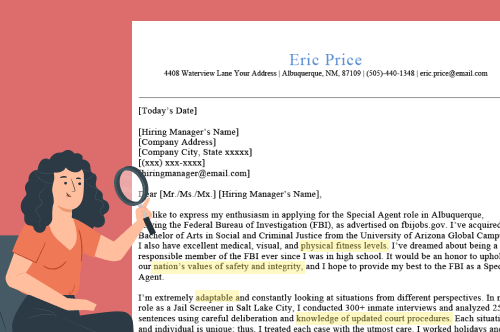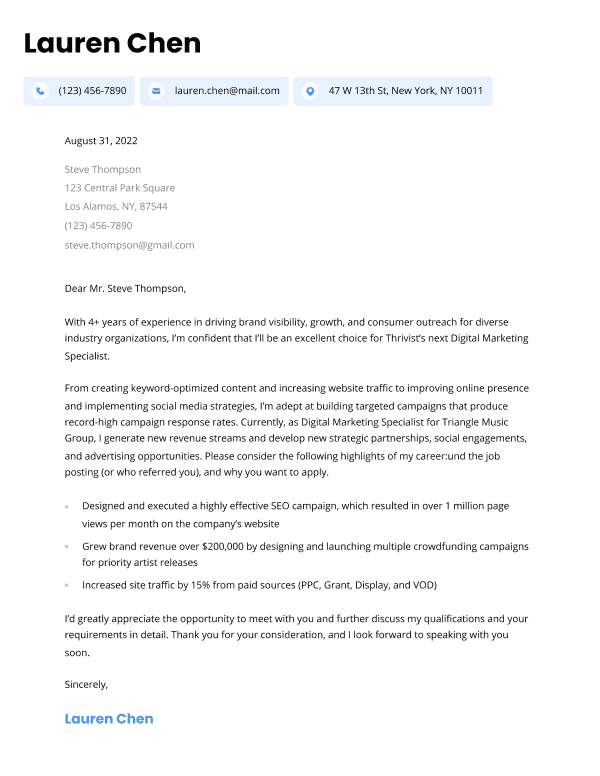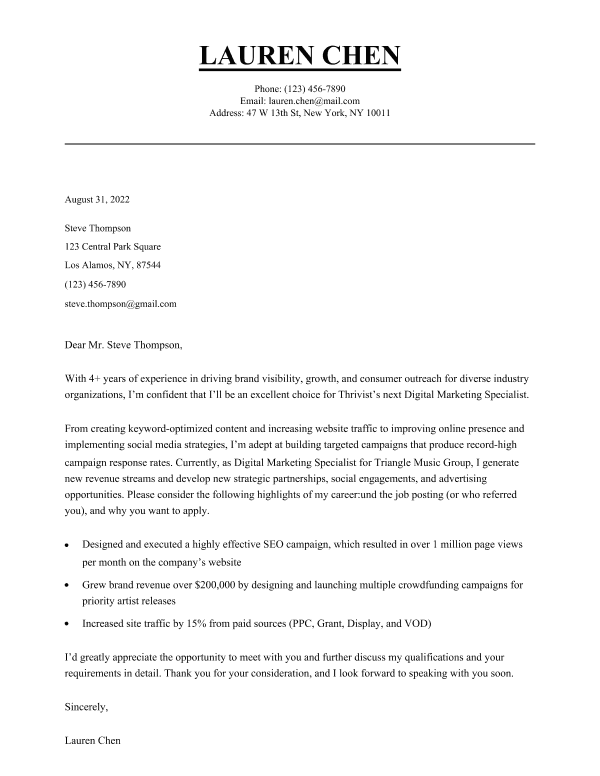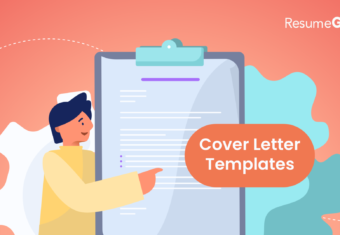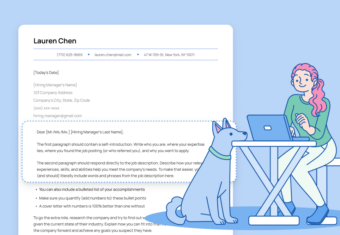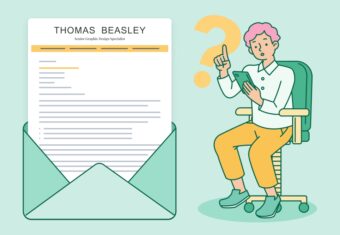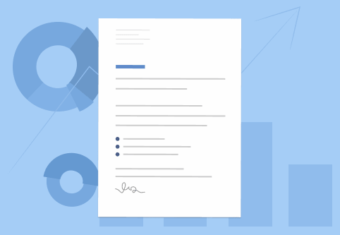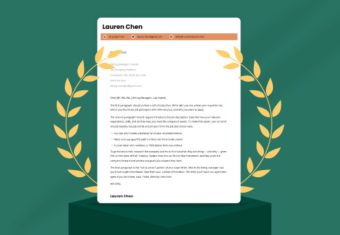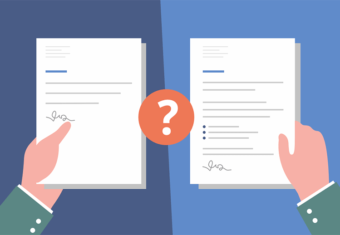A well-written cover letter makes a recruiter interested in you by instantly grabbing their attention and communicating why you’re the right person for the job.
However, there are certain keywords to use in a cover letter that will set you apart from other applicants and land an interview.
We examine what cover letter keywords are and why you should use them by providing examples and seven writing tips.
Our free-to-use cover letter builder can make you a cover letter in as little as 5 minutes. Just pick the template you want, and our software will format everything for you.
What are cover letter keywords?
Keywords for cover letters are words or phrases describing your hard and soft skills, work experience, and job-related achievements. Essentially, the cover letter phrases you use tell the recruiter why you’re the right fit for the job.
The keywords you use for your cover letters can be action verbs, adjectives, or nouns.
Why you should use cover letter keywords
You should use cover letter keywords when you write your cover letter to stand out to recruiters, because 55% of companies use an applicant tracking system (ATS) to filter applicants. This software scans for specific keywords and evaluates how closely a cover letter matches the recruiter’s ideal candidate.
So, write an ATS-friendly resume and cover letter by placing in the right industry keywords. Using appropriate cover letter words not only makes you look highly qualified for the position, but also increases your chances of making it to the interview stage.
While it may be tempting to use common buzzwords, they’re unlikely to get you noticed because hiring managers have already seen these expressions many times.
Try swapping out cover letter buzzwords with exciting and active language to increase your chances of progressing to the interview stage.
If you’re wondering what types of keywords there are, don’t worry. We’ve provided helpful keywords for your cover letter below.
Cover letter words you can use
Below are examples of keywords you can use to boost your cover letter. We’ve divided them into four categories (using colored underlines for your reference):
1. Cover letter action verbs
Action verbs are words that portray action. Cover letter action verbs:
- provide context to employers
- ensure you create a lasting impression
- enhance your cover letter’s readability
Here are some powerful action verbs to boost your cover letter:
Action verbs for a cover letter
- Administered
- Built
- Chaired
- Coordinated
- Created
- Developed
- Devised
- Founded
- Established
- Executed
- Formalized
- Formulated
- Headed
- Handled
- Implemented
- Initiated
- Introduced
- Led
- Managed
- Oversaw
- Organized
- Planned
- Pioneered
- Spearheaded
Here are some examples of what cover action letter words look like in a cover letter:
Statements that use action verbs
- Handled contract for purchasing 20 new printers
- Led 17-member team that strategized the company’s regional expansion
- Managed a team of 15 senior engineers, 9 junior engineers, and 5 interns
- Implemented the new product for 2021’s upcoming launch and presented at the annual tech conference
2. Recognition keywords
Hiring managers constantly look for outstanding performers, and your cover letter is the perfect opportunity to prove you’re a competent professional.
To assure hiring managers you’re suited for the role, incorporate keywords that highlight your performance and accomplishments in your previous role. Using these keywords allows the recruiter to envision how you’ll fit into the position.
Here are some examples of recognition-related keywords to enhance your cover letter:
Recognition words for a cover letter
- Appointed to
- Accomplished
- Acknowledged with
- Awarded with
- Chosen for
- Credited with
- Designated
- Distinguished
- Honored for
- Lauded for
- Promoted
- Recognized for
- Received
- Selected from
Use keywords to showcase your career milestones, as shown in the examples below:
Statements that use recognition words
- Appointed to lead a team of 7 engineers for the turbine project
- Lauded for my contribution to the success of our social media outreach program
- Promoted to regional sales manager after my team topped the company’s sales chart for 3 consecutive years
3. Skills keywords
Skills-based keywords allow you to highlight your essential hard skills and relevant soft skills for the job. Recruiters will believe you possess the requirements they’re seeking when you can connect such abilities back to your previous role.
An excellent way to know the correct keywords to use in a cover letter is to look through the job description and identify the exact skills the employer wants.
Here are some good words to see in a cover letter that displays your top skills:
Skill words for a cover letter
- Achieved
- Analyzed
- Built
- Created
- Delegated
- Designed
- Drafted
- Facilitated
- Generated
- Implemented
- Launched
- Planned
- Programmed
- Taught
- Researched
- Solved
Here’s how to include skills-based keywords in your cover letter:
Statements that use skill words
- Designed and implemented a customer order tracking system for the sales department
- Launched a department effort to reduce the number of abandoned carts on our online store
- Facilitated the sales of 350 units of our customer data software
4. Results-oriented keywords
Almost every job advertisement has a “results-oriented” requirement. Additionally, employers look for candidates who will generate fantastic results for their company. So use cover letter phrases that highlight your accomplishments alongside your skills.
Here are examples of results-oriented keywords you can include in your cover letter to quantify (add numbers to) your achievements:
Results-oriented words for a cover letter
- Achieved
- Contributed
- Established
- Gained
- Generated
- Improved
- Implemented
- Initiated
- Innovated
- Modernized
- Persuaded
- Produced
- Redesigned
- Secured
- Upgraded
- Updated
Check out these examples of results-oriented keywords on a cover letter:
Staements that use results-oriented words
- Established HR resolution unit to handle interdepartmental conflict and take disciplinary action
- Redesigned online store onboarding system, which reduced cart abandonment by 13%
- Produced an employee time management system that increased productivity by 10%
7 tips on how to use cover letter words
Knowing the right cover letter words to use is one thing — perfecting their use is another. Remember to look over a professional cover letter sample or two to compare with your own once you’re done writing. Now, let’s examine seven helpful cover letter tips to showcase how to get the best out of cover letter keywords.
1. Use relevant details instead of buzzwords
Buzzwords and clichés like “hard-working,” “go-getter,” and “think outside the box” are overly used, provide limited information, and don’t make your cover letter stand out.
Instead, we recommend writing a cover letter that provides details and varied phrases. Try doing the following:
- name specific projects and contributions from your previous roles
- use hard numbers to demonstrate years of experience, percentages, and relevant data
- list a variety of resume adjectives and verbs throughout your cover letter
- try using resume synonyms when you find a word repeated multiple times
Expanding upon your cover letter with concrete proof of your accomplishments and skill set will impress employers compared to simply making a generic statement.
2. Use active voice instead of passive voice
When it comes to writing cover letters and resumes, avoid using the passive voice. Instead, stick to the active voice for a strong, direct, and clear tone.
Here’s an example of sentence that uses passive voice:
A team of 7 engineers was supervised by me.
Instead, be direct and show how you’ve managed a team.
An excellent way to use active voice in your cover letter is to tweak the above statement by using an “I” statement:
I supervised 7 engineers who built a data analysis program to track the performance of our new product.
3. Tailor your skills and experiences to the job posting
Because an ATS searches for keywords that the employer listed on the job posting, we advise tailoring your cover letter to the keywords you see in the job ad.
Writing a targeted cover letter that uses appropriate skill keywords for cover letters is the best way to impress hiring managers. Your cover letter should highlight your skills, achievements, and familiarity with the industry, role, and employer.
4. Include a mix of keyword types
As well as using keywords found in the job ad, you should incorporate different cover letter keywords, ranging from action verbs to recognition keywords, skills keywords, and results-oriented keywords.
Using a mix of keywords lets you touch on different areas that may interest the recruiter — such as proof of your previous role, performance, and responsibilities — increasing your chances of being selected.
Overall, the language of the job posting determines the keywords you use.
5. Write naturally and avoid keyword stuffing
Cover letter keyword stuffing means unnaturally filling a cover letter with specific keywords to beat the applicant tracking system.
However, most ATS software detects these practices, so keyword stuffing can work against you, especially in cases where ATS software blocks your application or tells the hiring manager about keyword stuffing.
So instead of keyword stuffing, aim for natural language. Think about how you’d describe yourself in real life, and write in a similar way. You’re trying to woo recruiters, and showing some personality by using cover letter adjectives is good.
6. Use appropriate cover letter formatting
Writing a compelling cover letter also requires correct cover letter formatting. You want your application document to look polished and professional.
First, the ideal cover letter length shouldn’t be more than a page (450 words).
In addition, ensure you use proper cover letter spacing and margins. Another excellent way to ensure appropriate cover letter formatting is to look through well-written cover letter examples.
7. Proofread your cover letter
Because employers get hundreds of applications, a simple typo may harm your chances of getting an interview. After writing your cover letter, proofread it carefully to eliminate grammar and spelling errors.
Ensure you get all the details right, such as using good cover letter keywords, before sending it to a recruiter.
Click to rate this article
4.3 Average rating


